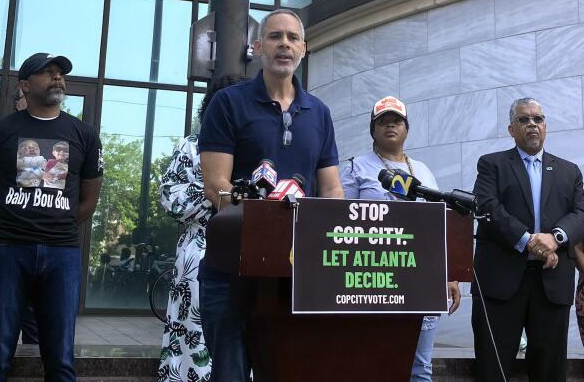They were arrested nearly two years ago. Now, with their lives on pause and no trial date in sight, several defendants say the waiting is its own punishment.
It’s been 20 months since the state of Georgia brought sweeping RICO charges against dozens of protesters accused of trying to stop a massive police training center. But for the 61 people caught up in the case, time hasn’t moved the way it should. Their legal battles remain stalled. Their lives? Many say they’re falling apart.
Some defendants say they’ve lost jobs, dropped out of school, or seen their mental health spiral. Others are stuck in a holding pattern—unable to plan their futures, unable to shake the fear of what could happen next.
They’re still technically innocent. But the wait is already reshaping their lives.
One of the Biggest RICO Cases in Protest History
The charges are big. The case? Even bigger.
Back in 2023, Georgia Attorney General Chris Carr indicted 61 people under the state’s Racketeer Influenced and Corrupt Organizations (RICO) statute. That’s the same kind of law often used against organized crime rings. This time, it’s being used on protesters.
The accusation? That they conspired in a multi-year effort to stop construction of the $90 million Atlanta Public Safety Training Center. Critics call it “Cop City.”
Most of the defendants were never arrested at the construction site. Many were allegedly tied to the movement through donations, flyers, camping at the protest area, or social media.

Prosecutors claim it’s all part of a pattern—a coordinated campaign of harassment, violence, and intimidation. Defense attorneys argue it’s an extreme overreach and a political attack on dissent.
And while the courtroom drama plays out behind closed doors, people’s lives hang in the balance.
Trial Delays Leave Defendants in the Dark
Originally, five of the 61 defendants were scheduled to go to trial in 2024. That never happened.
The reason? Delays, roadblocks, and courtroom reshuffling. The judge initially overseeing the case stepped down. A new judge, DeKalb County Superior Court Judge Brian Amero, took over and has now scheduled a status hearing for Wednesday.
But for people like Priscilla Grim, that hearing might feel like too little, too late.
Grim, a single mom, said she lost her job due to the legal uncertainty. “I can’t even make long-term plans for my child,” she said.
Another defendant, Julia Dupuis, says depression has taken over. “I stare at my ceiling every night. I feel like I’m living in purgatory,” she told reporters.
What Exactly Is ‘Cop City’?
At the heart of all this is a 85-acre plot in a forested area just outside Atlanta.
That’s where the Atlanta Police Foundation plans to build a sprawling public safety complex, including mock urban environments, shooting ranges, a helicopter pad, and space for police and fire training.
Supporters say it’s long overdue and essential for modernizing training. Opponents argue it militarizes police and bulldozes precious forestland, all while ignoring community voices.
Here’s a quick look at the project:
| Feature | Description |
|---|---|
| Site Location | South River Forest, southeast Atlanta |
| Project Cost | Estimated $90 million |
| Funders | Mix of private donations and public money |
| Project Size | 85 acres developed, in a 380-acre forest zone |
| Scheduled Completion | Targeted for late 2025 |
The protests escalated sharply in 2022 and 2023, especially after the fatal police shooting of activist Manuel “Tortuguita” Terán. Their death fueled national outrage and drew even more attention to the movement.
RICO Charges Raise Legal and Civil Rights Questions
Applying RICO to political protest is still rare. Civil liberties groups say it’s chilling.
“This is a test case,” said Michael Avery, a retired law professor and civil rights expert. “If the state wins here, it could become a model for suppressing dissent nationwide.”
What makes the case so controversial is how it ropes in people who weren’t involved in acts of violence. For example, some defendants are accused of minor property damage. Others? Just of organizing mutual aid.
Key points critics raise:
-
RICO’s sweeping net makes it easy to criminalize associations rather than actual acts.
-
It can delay trials and keep people in limbo for years.
-
Prosecutors have an easier time building pressure to plead guilty.
Meanwhile, Georgia prosecutors say the law is being used appropriately. “You can’t hide behind activism to commit crimes,” Attorney General Carr said at the time of the indictments.
The Human Toll Is Quiet, But Crushing
Behind all the legal jargon and media buzz, there are real people. Real stories.
Hannah Kass is a Ph.D. student. She fears her entire academic future could unravel if the case drags out or ends in conviction. “You work for years to build a career,” she said. “And now I might not even be able to graduate.”
Others are struggling to keep relationships intact. One woman said her partner left, unable to handle the stress of the case. Another defendant, who asked not to be named, said they’ve stopped looking for jobs altogether—too scared an employer might Google their name.
In between the court filings and legal motions, life just keeps slipping through the cracks.
What’s Next? Nobody Really Knows
Wednesday’s hearing might bring some clarity. But even that’s uncertain.
There’s no official trial date yet. Motions are still flying. And with 61 defendants, organizing a single courtroom schedule has proven nearly impossible.
One attorney close to the case described the situation bluntly: “It’s chaos.”
Meanwhile, the bulldozers keep moving, trees keep falling, and construction at the training center continues. Protesters call it desecration. The city calls it progress.
And for the defendants still waiting, there’s no clear end in sight.
